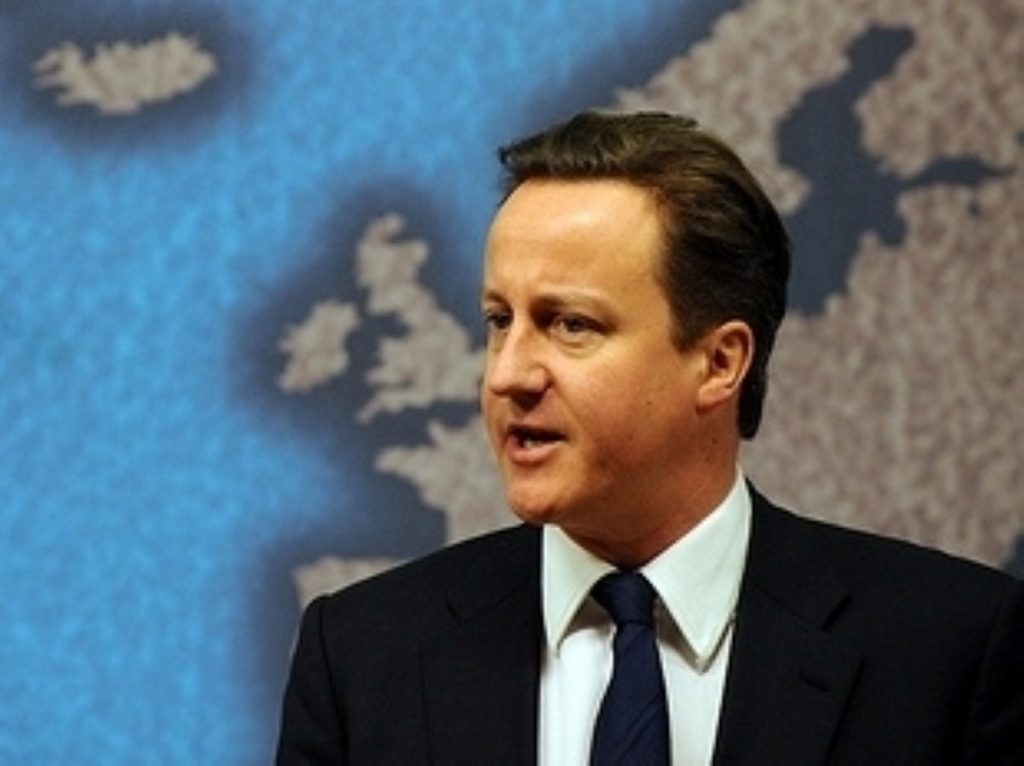Eurosceptic Tories hammer Cameron in PMQs
By Alex Stevenson Follow @alex__stevenson
David Cameron faced an unrelenting barrage of hostile questions on Europe from his own party's backbenchers in one of his toughest ever PMQs this lunchtime.
The prime minister repeatedly insisted he would look to secure "safeguards" protecting Britain's financial services sector whenthe EU's eurozone leaders bring forward proposals to solve the eurozone crisis at the end of this week.
His comments were not enough to relieve intense pressure as Conservative MPs lined up to demand a tougher line on the repatriation of powers to Britain, however.


Andrew Rosindell began PMQs by calling on Mr Cameron to demonstrate a "bulldog spirit" during the negotiations.
The prime minister replied that he would pursue Britain's national interest by ensuring the eurozone crisis is fixed, while seeking "safeguards for Britain" at the same time.
He insisted that "the more the eurozone countries ask for, the more Britain will ask for in return" during an exchange with Labour leader Ed Miliband, but that did not prove sufficiently reassuring to end questions from his own party.
Tory MP Steven Baker called on Britain to "leave Europe" altogether. John Baron said a "fundamental renegotiation of power" was called for and that Mr Cameron had a "once-in-a-lifetime opportunity" to tackle the issue.
Julian Lewis warned against a "dangerously undemocratic single government" which could result from closer integration by the EU's 17 eurozone countries.
The prime minister also faced questions on Europe from opposition backbenchers, including the DUP's Nigel Dodds who repeated calls for a referendum and former business minister Pat McFadden.
Mr Cameron faced the torrent of questions by arguing that he would defend Britain's national interest based on the level of change finally proposed by European leaders.
"Let's be clear: there's the option of a treaty at 27 where we have the option to say yes or no, and as a result get a price for that," he explained.
"But there is always the possibility the eurozone members at 17 will go ahead and form a treaty of their own.
"Again, we have some leverage in that situation, because they need the use of EU institutions, but we should recognise exactly what our leverage is and make the most of it."
Just after the session ended, two interviews with senior Conservatives made life even more difficult for the prime minister.
London mayor Boris Johnson said: "If there's a new treaty at 27, if there's a new EU treaty that creates a kind of fiscal union within the 27 countries, or let's say within the eurozone, we'd have absolutely no choice either to veto it but certainly to put it to referendum."
Northern Ireland Secretary Owen Paterson added: “If there was a major fundamental change in our relationship, emerging from the creation of a new bloc which would be effectively a new country from which we were excluded, then I think inevitably there would be huge pressure for a referendum. I think there will have to be one, yes, because I think the pressure would build up.”
Cameron's deal: Safeguards but no return of powers
The prime minister struggled throughout PMQs as he sought to continue his balancing act ahead of this week's critical EU summit.
He had made his position clear in a newspaper article in which he pledged to block an EU treaty which does not back Britain's national interest – but also played down the prospect of a referendum.
Only the transfer of powers from London to Brussels would trigger a referendum, Mr Cameron made clear. A potential deal among the eurozone's 17 countries to bring about closer fiscal integration would not qualify.
A broader agreement which leads to rule changes affecting all 27 EU member states may result in a different outcome, however.
"If we are changing the treaty that applies to all EU countries and allowing the eurozone countries to have new rules, it is also important that there are rules to keep the single market fair and open for key industries for Britain, including financial services," Mr Cameron wrote in the Times newspaper.
"Clearly, we will need to look at the right safeguards for Britain in the light of what is proposed. Our colleagues in the EU need to know that we will not agree to a treaty change that fails to protect our interests."
It is not yet clear whether broader treaty changes in this scenario would trigger a referendum. Tory backbenchers are desperate for the prime minister to use the eurozone crisis to renegotiate Britain's relationship with the EU.
Justice secretary Ken Clarke made clear that Britain's focus should be on securing the eurozone's future in an interview with the Financial Times.
"We're not going to renegotiate any transfers of powers, in my opinion," he told the newspaper.
Monday saw German chancellor Angela Merkel and French president Nicolas Sarkozy outline their plans for a "treaty change" for eurozone members.
This would hand the ECJ the power to check whether eurozone countries had enshrined rules about their national debt in their constitution.
"The ECJ cannot cancel budgetary agreements – however, we hope every constitution from all the 17 countries of the eurozone have a golden rule on deficit that targets equilibrium and balance," Mr Sarkozy said.
The prime minister explained that reforms affecting EU institutions like the European court of justice would affect all EU member states and so "would clearly require safeguards".
He added: "Our requirements will be practical and focused. But eurozone countries should not mistake this for any lack of steel."

